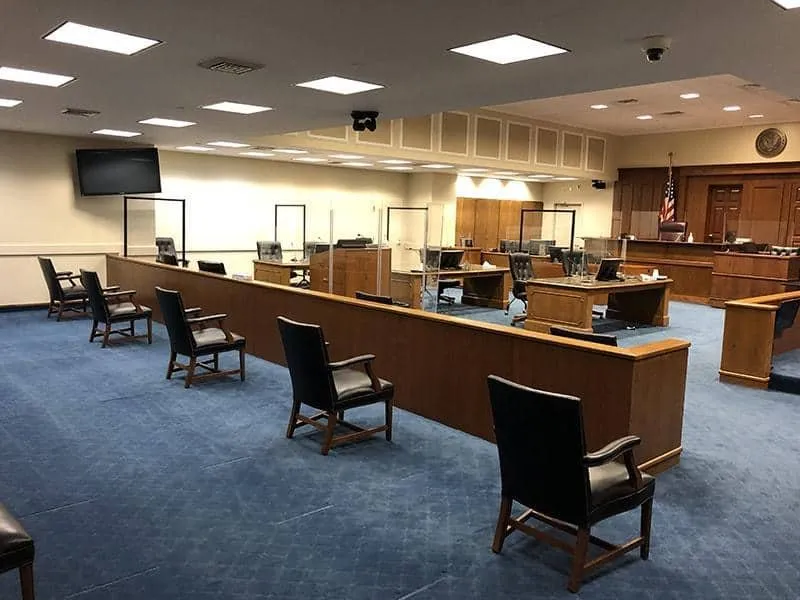
In a Baltimore courtroom, plexiglass divides the parties and court staff, and juror chairs are being kept at a safe social distance.
Working on the front lines of justice amid the pandemic, federal defenders are navigating uncharted territory as they work to maintain virtual access to clients in detention facilities and participate in socially distanced trials and hearings.
“There is no one size fits all approach to solving the challenges that the pandemic has created for defenders,” said Wesley P. Page, the federal public defender in the Southern District of West Virginia. “We are constantly adapting in an effort to maintain access to our clients and find new ways to keep cases moving safely through the court system.”
Through resiliency and innovation, federal defenders have continued to zealously advocate for those unable to afford an attorney, a right guaranteed by the Sixth Amendment to the Constitution and the Criminal Justice Act. Early on in the pandemic, some defenders worked with court offices to procure audio and video equipment to help bridge the physical distance with detained clients.
In the Western District of Missouri, IT staff in the defender office programmed iPads with videoconferencing software, so that attorneys could conduct private and secure virtual visits with clients in detention facilities. Working with the U.S. Attorney’s Office, defenders received permission to put discovery documents on encrypted flash drives. This enabled them to review the materials with clients virtually, a process normally done in person.
“Technology has been a saving grace for us during the pandemic, but it can’t ever replace the connection that you create with a client through an in-person visit,” said Laine Cardarella, the federal public defender in Western Missouri. “I think videoconferencing technology can complement face-to-face visits beyond the pandemic. It gives us a way to immediately update clients on their cases, rather than having to wait until we can make a sometimes several-hour round trip from the office to the detention facility.”
With the rollout of multiple coronavirus (COVID-19) vaccines, defenders across the country are hoping that they and other court personnel can move up on state and local vaccination priority lists to help make conducting court proceedings safer. However, until a larger portion of the population is vaccinated, in-person trials and hearings will continue to look much like they did last summer, with strict social distancing guidelines.
“Trials are already stressful for lawyers, clients, and jurors. The added risk of infection with a deadly virus – regardless of the safety measures – only adds to that stress,” said Marjorie A. Meyers, the federal public defender in the Southern District of Texas.
Socially distanced trials look quite different from the typical in-person trials. Participants wear masks, large plexiglass partitions separate the participants from each other, lawyers wear headsets to confer with their clients, and jurors sometimes are assigned chairs wrapping around the courtroom.
“While these safety measures are necessary in helping us move clients’ cases through the system, it makes developing relationships with clients very difficult because it looks like we’re afraid of them,” Cardarella said. “Our clients can’t see our smile as we greet them, we can’t give them a pat on the back, shake their hand, or even sit next to them at the defense table.”
Federal defenders hope to continue having productive discussions with judges, detention officials, U.S. attorney’s offices, and probation and pretrial services officers to tackle issues of fostering safe and effective interactions among the parties in courtrooms, and empaneling juries that are representative of the community.
“There is a constant tension between safety and due process as we steer our way through the pandemic, and as courts continue to manage a growing backlog of cases,” Meyers said. “We will continue to do everything in our power to make our clients’ voices heard.”
Subscribe to News Updates
Subscribe to be notified when the news section is updated.
